Hundreds March For "Terror" Accused In Auckland
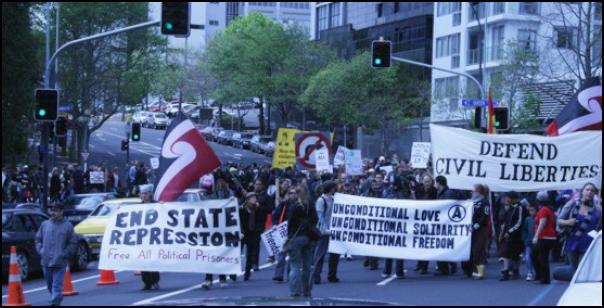
Hundreds March For "Terror" Accused In Auckland
Story and Images Joseph Barratt
Protesting this week's early morning raids and demanding that police abandon their threats of terrorist charges against the17 activists arrested, a couple of hundred people rallied in support of the accused and ridiculed proposed new terror laws in Auckland today.
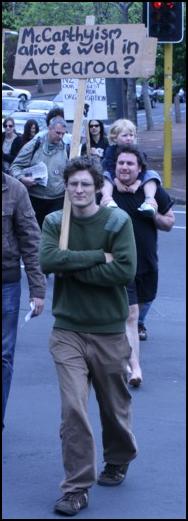 Showing a unified
front the protest was attended by a wide range of activist
groups, and also included family and friends of the
accused.
Showing a unified
front the protest was attended by a wide range of activist
groups, and also included family and friends of the
accused.
But for many there is also the larger fear of what the arrests represent, and of what could happen if the legislation amending the Terrorism Suppression Act of 2002 currently before Parliament is passed.
Speaking to the crowd, Auckland Global Peace And Justice organiser John Minto condemned the police’s threats to charge the accused of offences under the terrorism statute.
“They have had 15 months of intensive watching,” he said. "They would know by now whether they have the evidence. They are just using it as a tool to smear these activists with the terrorist brush. These arrests are not about terrorism it is about civil liberties," he said.
“They are trying to create a climate to make us believe this legislation is important.”
Barry Wilson from the Auckland Council of Civil Liberties said, “the only real terrorists are those wearing black commando gear last Monday.”
“This is just a bid for the police commissioner to increase his powers,” said Wilson.
In a seemingly unplanned move the rally which began in Aotea Square took to Queen St and marched to the Auckland City central police station chanting slogans. “When human rights are under attack, stand up fight back.” “Rickards in, Tame Iti out”
At the police station several activists tried to remove the New Zealand flag with police emblem and replace it with the Tino Rangatiratanga, Maori sovereignty, flag.
Several police came out and after a brief scuffle the activists managed to get away.
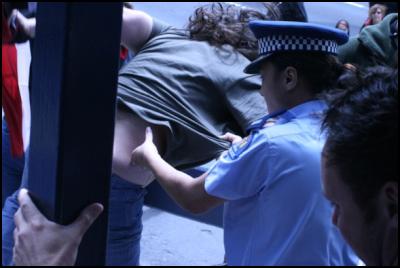
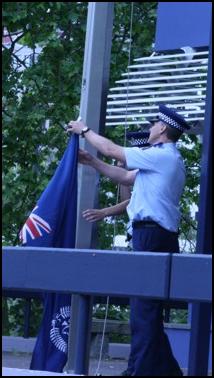 Green Party MP’s,
Sue Bradford and Keith Locke, were also both at the protest.
Green Party MP’s,
Sue Bradford and Keith Locke, were also both at the protest.
Locke spoke saying New Zealand was looking hard for a way to join the war on terror.
“They were happy when [Algerian refugee] Ahmed Zaoui came along, we had our very own terrorist. When that fell through they went after activists.”
Locke also said there are enough provisions under New Zealand’s criminal laws to deal with all these issues, "we don’t need terror laws".
The timing of the raids has also raised suspicion with some of the activists, one told the crowd, “how can they justify it, the police raid these homes the same week this legislation is going before parliament.”
"Its obviously a political maneuver", she said.
The Terrorism Suppression Amendment Bill is presently high up the Parliamentary order paper and may receive a second reading in Parliament this week. The proposed legislation will change New Zealand’s rules about defining terrorist groups.
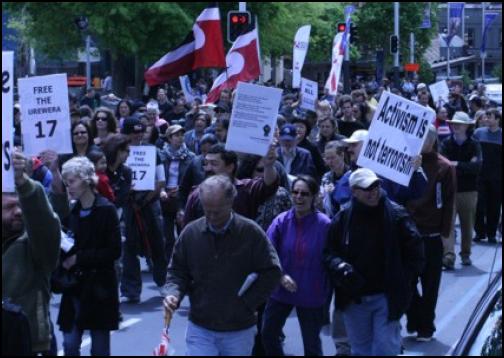
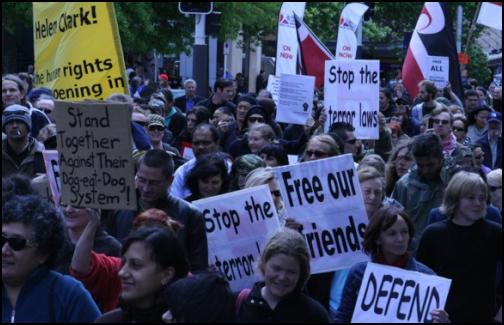
Among other changes under the proposed new legislation the New Zealand Prime Minister will have the power to designate terrorist groups without any court review.
The new legislation also removes the provision allowing people to support groups designated as terrorists if their goals are human rights and democracy.
If this legislation had been in place in 1981 then it would have made it illegal to support the release of Nelson Mandela from prison and to show solidarity to the African National Congress in South Africa that was struggling to end apartheid, John Minto said..
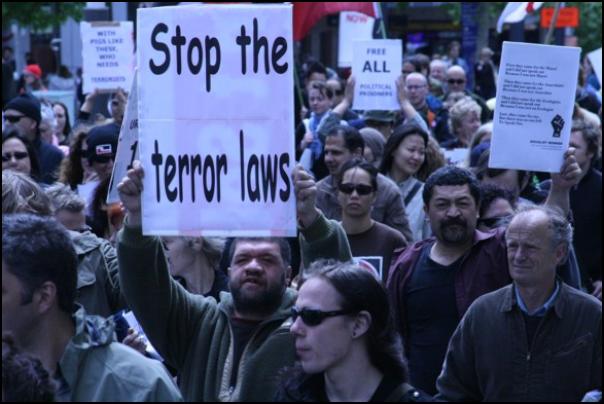
ENDS


 Eugene Doyle: Writing In The Time Of Genocide
Eugene Doyle: Writing In The Time Of Genocide Gordon Campbell: On Wealth Taxes And Capital Flight
Gordon Campbell: On Wealth Taxes And Capital Flight Ian Powell: Why New Zealand Should Recognise Palestine
Ian Powell: Why New Zealand Should Recognise Palestine Binoy Kampmark: Squabbling Siblings - India, Pakistan And Operation Sindoor
Binoy Kampmark: Squabbling Siblings - India, Pakistan And Operation Sindoor Gordon Campbell: On Budget 2025
Gordon Campbell: On Budget 2025 Keith Rankin: Using Cuba 1962 To Explain Trump's Brinkmanship
Keith Rankin: Using Cuba 1962 To Explain Trump's Brinkmanship